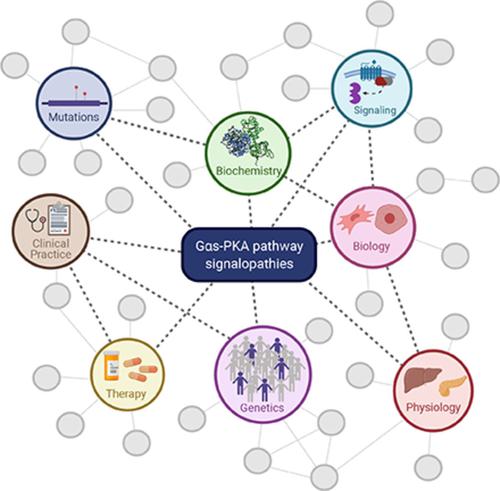当前位置:
X-MOL 学术
›
Pharmacol. Rev.
›
论文详情
Our official English website, www.x-mol.net, welcomes your feedback! (Note: you will need to create a separate account there.)
Gαs–Protein Kinase A (PKA) Pathway Signalopathies: The Emerging Genetic Landscape and Therapeutic Potential of Human Diseases Driven by Aberrant Gαs-PKA Signaling
Pharmacological Reviews ( IF 21.1 ) Pub Date : 2021-10-01 , DOI: 10.1124/pharmrev.120.000269 Dana J Ramms 1 , Francesco Raimondi 1 , Nadia Arang 1 , Friedrich W Herberg 1 , Susan S Taylor 1 , J Silvio Gutkind 2
Pharmacological Reviews ( IF 21.1 ) Pub Date : 2021-10-01 , DOI: 10.1124/pharmrev.120.000269 Dana J Ramms 1 , Francesco Raimondi 1 , Nadia Arang 1 , Friedrich W Herberg 1 , Susan S Taylor 1 , J Silvio Gutkind 2
Affiliation

|
Many of the fundamental concepts of signal transduction and kinase activity are attributed to the discovery and crystallization of cAMP-dependent protein kinase, or protein kinase A. PKA is one of the best-studied kinases in human biology, with emphasis in biochemistry and biophysics, all the way to metabolism, hormone action, and gene expression regulation. It is surprising, however, that our understanding of PKA’s role in disease is largely underappreciated. Although genetic mutations in the PKA holoenzyme are known to cause diseases such as Carney complex, Cushing syndrome, and acrodysostosis, the story largely stops there. With the recent explosion of genomic medicine, we can finally appreciate the broader role of the Gαs-PKA pathway in disease, with contributions from aberrant functioning G proteins and G protein–coupled receptors, as well as multiple alterations in other pathway components and negative regulators. Together, these represent a broad family of diseases we term the Gαs-PKA pathway signalopathies. The Gαs-PKA pathway signalopathies encompass diseases caused by germline, postzygotic, and somatic mutations in the Gαs-PKA pathway, with largely endocrine and neoplastic phenotypes. Here, we present a signaling-centric review of Gαs-PKA–driven pathophysiology and integrate computational and structural analysis to identify mutational themes commonly exploited by the Gαs-PKA pathway signalopathies. Major mutational themes include hotspot activating mutations in Gαs, encoded by GNAS, and mutations that destabilize the PKA holoenzyme. With this review, we hope to incite further study and ultimately the development of new therapeutic strategies in the treatment of a wide range of human diseases.
中文翻译:

Gαs-蛋白激酶 A (PKA) 通路信号病:由异常 Gαs-PKA 信号传导驱动的人类疾病的新兴遗传景观和治疗潜力
信号转导和激酶活性的许多基本概念都归因于 cAMP 依赖性蛋白激酶或蛋白激酶 A 的发现和结晶。 PKA 是人类生物学中研究最多的激酶之一,重点是生物化学和生物物理学,一直到新陈代谢、激素作用和基因表达调控。然而,令人惊讶的是,我们对 PKA 在疾病中的作用的理解在很大程度上被低估了。尽管已知 PKA 全酶中的基因突变会导致卡尼综合征、库欣综合征和肢端发育不全等疾病,但故事基本上到此为止。随着最近基因组医学的爆炸式增长,我们终于可以体会到 G α的更广泛作用疾病中的 s-PKA 通路,由功能异常的 G 蛋白和 G 蛋白偶联受体的贡献,以及其他通路成分和负调节剂的多种改变。这些共同代表了一个广泛的疾病家族,我们称之为 G α s-PKA 通路信号病。G α s-PKA 通路信号病包括由 G α s-PKA 通路中的种系、合子后和体细胞突变引起的疾病,主要具有内分泌和肿瘤表型。在这里,我们对 G α s-PKA 驱动的病理生理学进行了以信号为中心的回顾,并整合了计算和结构分析来识别 G α通常利用的突变主题s-PKA 通路信号病。主要突变主题包括由 GNAS 编码的Gαs 中的热点激活突变,以及使 PKA 全酶不稳定的突变。通过这篇综述,我们希望激发进一步的研究,并最终开发出治疗多种人类疾病的新治疗策略。
更新日期:2021-10-18
中文翻译:

Gαs-蛋白激酶 A (PKA) 通路信号病:由异常 Gαs-PKA 信号传导驱动的人类疾病的新兴遗传景观和治疗潜力
信号转导和激酶活性的许多基本概念都归因于 cAMP 依赖性蛋白激酶或蛋白激酶 A 的发现和结晶。 PKA 是人类生物学中研究最多的激酶之一,重点是生物化学和生物物理学,一直到新陈代谢、激素作用和基因表达调控。然而,令人惊讶的是,我们对 PKA 在疾病中的作用的理解在很大程度上被低估了。尽管已知 PKA 全酶中的基因突变会导致卡尼综合征、库欣综合征和肢端发育不全等疾病,但故事基本上到此为止。随着最近基因组医学的爆炸式增长,我们终于可以体会到 G α的更广泛作用疾病中的 s-PKA 通路,由功能异常的 G 蛋白和 G 蛋白偶联受体的贡献,以及其他通路成分和负调节剂的多种改变。这些共同代表了一个广泛的疾病家族,我们称之为 G α s-PKA 通路信号病。G α s-PKA 通路信号病包括由 G α s-PKA 通路中的种系、合子后和体细胞突变引起的疾病,主要具有内分泌和肿瘤表型。在这里,我们对 G α s-PKA 驱动的病理生理学进行了以信号为中心的回顾,并整合了计算和结构分析来识别 G α通常利用的突变主题s-PKA 通路信号病。主要突变主题包括由 GNAS 编码的Gαs 中的热点激活突变,以及使 PKA 全酶不稳定的突变。通过这篇综述,我们希望激发进一步的研究,并最终开发出治疗多种人类疾病的新治疗策略。


























 京公网安备 11010802027423号
京公网安备 11010802027423号